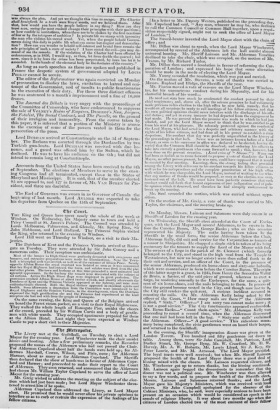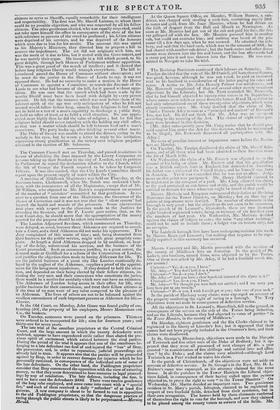On Monday, Messrs. Lainson arid Salomons were duly sworn in
as Sheriffs of London for the ensuing year.
On Wednesday, the Sheriffs elect attended at the Court of Excite- (pier, with the Lord Mayor and several Aldermen, to be sworn in be- fore the Cursitor Baron, Mr. George Banks ; who on this occasion represented his Majesty. The oaths having been taken by the Sheriffs in the usual form, the senior Alderman below the Chair, Alderman Kelly, did suit and service for the Corporation as tenants of a manor in Shropshire. lie chopped a single stick in token of its being customary for the tenants to supply the Lord of the Manor with fuel. The owners of a forge in the parish of St. Clement (which formerly belonged to the City, and stood in the high road from the Temple to Westminster, but now no longer exists) were then called forth to do their suit and service, and an officer of the Court, in the presence of the senior Alderman, produced six horse-shoes and sixty-one hobnails, which were counted over in form before the Cursitor Baron. The origin of this latter usage is a grant, in 123.5, from Henry the Second to Walter de Bruin, a furrier, of the said piece of ground, whereon to erect a forge, he rendering annually to the Exchequer, for the same, a quit- rent of six horse-shoes, and the nails belonging to them. In process of time the ground become vested in the City, and though now lost to it, the City still renders the quit-rent. A curious incident occurred in counting the nails. On Mr. Alderman Kelly being asked by the officer of the Court, " How many nails are there ?" the Alderman replied, " Sixty." Officer—" I am sorry you cannot make more ; it is not a good service." The City functionaries appeared confounded. Mr. Baron Banks—" Count them again." Mr. Alderman Kelly was proceeding to count a second time, when the Alderman discovered that one nail had been left in the bag. " Sixty-one nails" exclaimed the Alderman. Officer—" A good service." This ridiculous mum- mery being completed, the civic gentlemen went on board their barges, and returned to the Guildhall.
In the evening, the Sheriffs' inauguration dimmer was given at the London Tavern. Two hundred and fifty gentlemen sat down to table. Among them, were Sir John Campbell, Mr. Pattison, Lord Dudley Stuart, Mr. George Byng, Mr. W. Crawford, Mr. D. W. Harvey, Mr. A. W. Roberts, Mr. Lewis Lloyd, Sir J. Key, Sir Peter Laurie, and Mr. M. Attwood. The Lord Mayor presided. The loyal toasts were well received ; but when Mr. Sheriff Lamson proposed the health of the Lord Mayor there was a good deal of hissing mixed with the cheers. Mr. Lainson requested silence, and Mr. Winchester got up to return thanks, but the hissing continued. Mr. Lainson again begged the dissentients to remember that the dinner was not a political one. Mr. Winchester was then allowed
to say a few words, and to propose the health of the Sheriffs elect.
Messrs. Lainson and Salomons returned thanks; and the Lord Mayor gave his Majesty's Ministers, which was received with loud cheers. Sir John Campbell apologized for the absence of the
Cabinet Ministers, who, he said, were especially anxious to have been present on an occasion which would be considered an epoch in the annals of religious liberty. It was about two months ago when the citizens of London elected two of the most eminent of their fellow citizens to serve as Sheriffs, equally remarkable for their intelligence and respectability. The first was Mr. Sheriff Lainson, to whom there could be no possible objection, and who was respected by all his fellow citizens. The other gentleman elected, who was equally respi cted, could not take upon himself the office in consequence of the state of the law with reference to persons of the creed he professed ; his fellow citizens were deprived of his services, and he was deprived of the honours which were due to him for his merits. The moment this was stated to his Majesty's Ministers, they directed him to prepare a bill to remove the impediment. The act did not originate with him, nor was the merit of it due to him, but it rested with the Goveinment, and be was merely their organ. He brought in a bill which passed, to his great delight, through both Houses of Parliament without opposition. This was a great proof of the much of intellect ; and it showed that before long religious liberty would triumph everywhere. The bill he introduced passed the House of Commons without observation ; and he must do the justice to the House of Lords to say, it was not opposed there. He had no necessity to make a motion in the House of Commons to appoint a Committee to search the Journals of the Lords to see what had become of the bill, for it passed without oppo- sition. He was sure that the speech which had been made by the worthy Sheriff must live been heard with delight by every person present. He felt that the instance which was now before them of the tolerant spirit of the age was only anticipatory of what he felt and trusted would follow before long, .namely, that religious belief would not be held as a test of a man's capability to discharge a public duty, to hold an office of trust, or to fulfil a civil situation. No one appre- ciated more highly than he did the value of religion ; but le felt that religious belief should never interfere with the holding any civil office, as that was a matter which should be left between God and a man's conscience. The party broke up, after drinking several other toasts.
The Duke of Sussex was unable to attend the dinner, owing to the malady in his eyes, but he wrote a hater in reply to his invitation, expressing strong gratification at the victory over religious prejudice obtained in the election of Mr. Salomons.



























 Previous page
Previous page